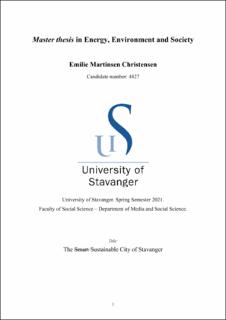| dc.description.abstract | Smart city initiatives have in many ways become an answer for solving societal issues in an
urban context. But lately, a debate has arisen concerning to what degree the smart city, with
its technological focus, facilitates sustainable cities and societies. This study investigates to
what extent smart city initiatives and climate and environment initiatives can co-exist and
mutually solve climate and environmental challenges in cities. The study applies an abductive
research strategy to qualitative data produced from a case study of Stavanger municipality in
Norway. It draws on document analysis and semi-structured interviews with actors from the
public and private sector related to the smart city and climate and environment commitment in
Stavanger. The findings from this research will be discussed up against relevant theoretical
frameworks. Governmental inter-organizational information integration (GIII) will be applied
to the discussion to evaluate communication, transparency, collaboration, and coordination in
the municipality organization. Additionally, the discussion will use regional industrial path
development (RIPD) to map out possibilities for sustainable industry development in the
Stavanger region. The research has shown that the smart city and the climate and environment
commitments in Stavanger municipality fail to coordinate their work. However, they share
several of the same focus areas with their related challenges. These commitments show
different sets of values and approaches towards climate and environmental challenges. These
differences result in misconceptions and cast a shadow over possible collaborations. The
Stavanger region finds itself struggling from solid dependency on the declining oil and gas
industry concerning sustainable business development. But the smart city commitment can
facilitate the growth of new, green industries in the region, given that local policies facilitate
it. | |
